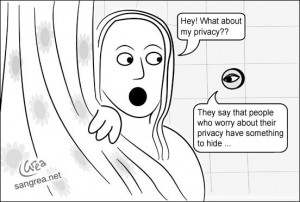Advertising Ex-Girlfriend’s Abortion Goes Beyond Free Speech
As you probably know, the United States has some of the strongest legal protections for free speech in the world. It’s very, very difficult for the government, at any level (federal, state, or local), to stop someone from speaking their mind, regardless of the ideas being expressed, and the way in which they choose to express them.
There are limits to the right to free speech, and almost all of them come up when a person engages in conduct that violates the rights of others, such as fraud, defamation, or invasion of privacy.
Such was the case recently, when a man, spurned by his ex-girlfriend, posted a billboard above a highway, claiming that she had an abortion. It showed the man in a photo, holding the outline of a baby, with text that said “this would have been a picture of my 2-month old baby if the mother had not decided to kill our child.” That’s pretty inflammatory stuff, especially when the woman involved in the relationship sees the billboard.
Although the woman’s name was not used, people who knew both her and the man who put up the billboard were obviously able to figure out who it was talking about. She sued, seeking a protective order requiring that the billboard be taken down. This lawsuit immediately ignited a moderate amount of controversy, sparking debate between a variety of factions concerned with issues such as free speech, privacy, abortion rights, and fathers’ rights.
For her part, the mother claims that she did not even have an abortion, but actually had a miscarriage.
The truth of either of those claims is largely irrelevant. What matters is the woman’s right to privacy, and her right to be free from harassment.
American courts have held for quite some time that there is a constitutional right to privacy, which applies mostly against the government. However, under the common law, there is generally a right of privacy against private (non-governmental) parties, as well. This generally means that you can sue when someone invades your privacy and discloses private facts about you to the public in a manner that a reasonable person would find objectionable. There are also longstanding laws against defamation, and the Supreme Court has long held that, for the most part, the First Amendment’s right to free speech does not significantly limit a person’s right to sue for defamation or invasion of privacy.
 However, the man who put up the billboard argued that the constitution protected him. Indeed, there are some cases where the right to sue for defamation is limited by the constitution’s guarantee of free speech. For example, when defamatory statement discusses a public figure, or a matter of public concern, the First Amendment kicks in, and it becomes much more difficult for the person(s) mentioned in the statement to sue for defamation, even if the statement is defamatory and untrue.
However, the man who put up the billboard argued that the constitution protected him. Indeed, there are some cases where the right to sue for defamation is limited by the constitution’s guarantee of free speech. For example, when defamatory statement discusses a public figure, or a matter of public concern, the First Amendment kicks in, and it becomes much more difficult for the person(s) mentioned in the statement to sue for defamation, even if the statement is defamatory and untrue.
Based on this, he argued that he was simply stating his opinion on abortion, which is a matter of public concern. Nonetheless, the judge found that his right to express these views (to the extent that that was the actual purpose of the billboard, which seems doubtful) does not, in this case, outweigh his ex-girlfriend’s right to privacy, and to be free from harassment.
I think that this was the right call. While I almost always come down on the side of free speech, I also recognize that there is a right to privacy, especially when it comes to reproductive issues. If the guy who put up the billboard was being truthful when he said he simply wanted to express his opinions on abortion, he could have done so in any number of other ways, which did not need to expose his ex-girlfriend to humiliation and harassment. And, if the billboard was intended to be specifically about his ex, then whether or not that particular person had an abortion is nobody’s business, and therefore not a matter of public concern. This means that her right to privacy strongly outweighs the man’s right to free speech.
Whether or not she actually had an abortion is mostly irrelevant, but if she didn’t have an abortion, and actually had a miscarriage, I can only imagine how hurtful that billboard must have been to her.
There will always be cases where people who believe themselves to have been wronged will attempt to publicly humiliate the person they perceive as the wrongdoer. After all, public humiliation is a pretty potent form of revenge. However, the whole reason we have a legal system is to ensure that people who believe they’ve been wronged don’t resort to the type of “self-help” that this guy decided was necessary. If he believed he had been wronged, there are many, many ways he could have better handled the situation.

Comments